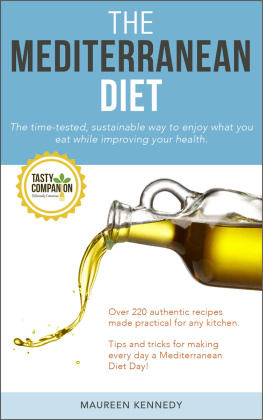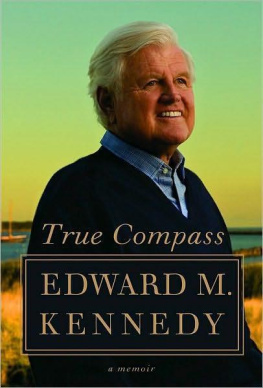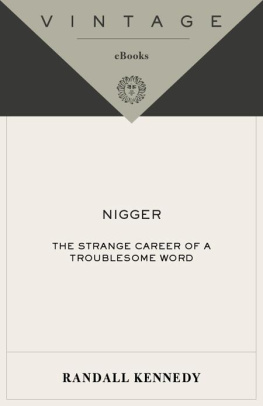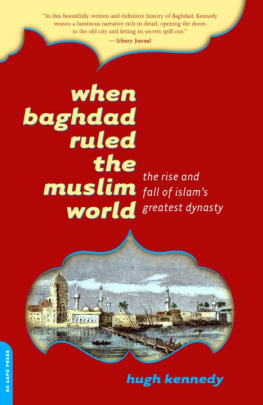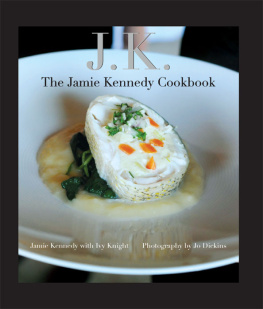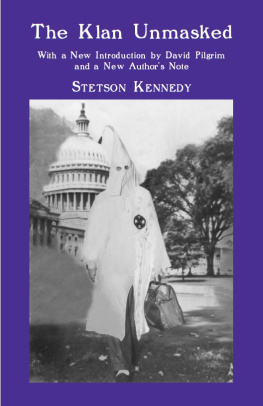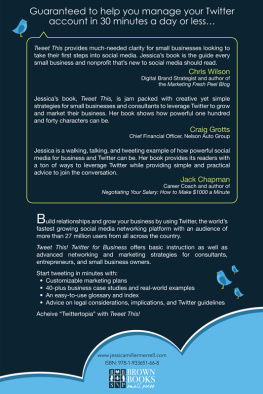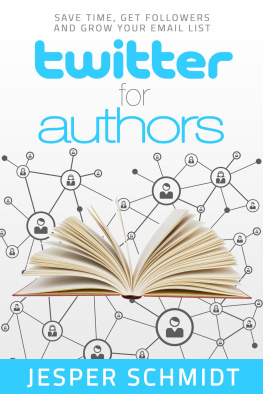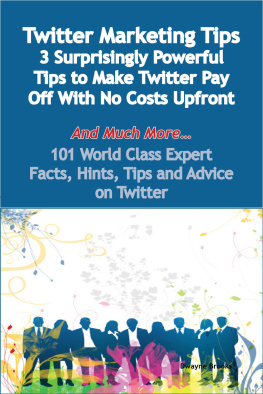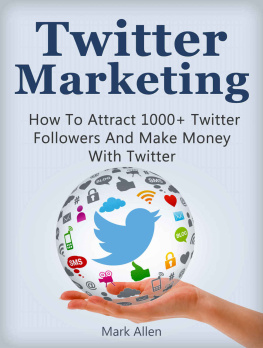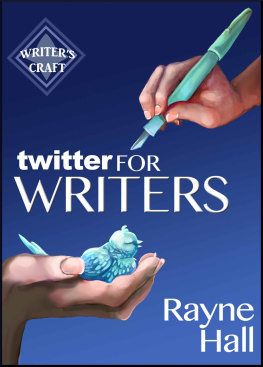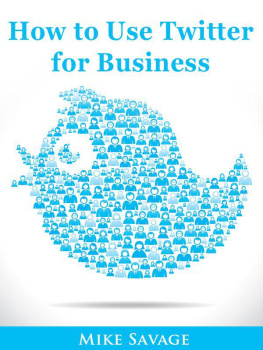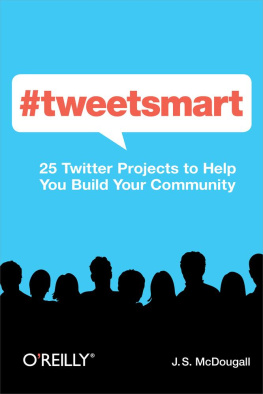Twitter for Authors: A Busy Writers Guide
First Edition
Copyright 2014 Marcy Kennedy
All rights reserved.
This e-book is licensed for your personal enjoyment only. No portion of this book may be reproduced or transmitted in any form or by any means, electronic or mechanical, including photocopying, recording, or by any information storage and retrieval system without written permission from the author, except for the inclusion of brief quotations in a review. This e-book may not be re-sold, as a used file or otherwise, and may not be given away to other people. Purchase and download is a one-time final use of this product. If youre reading this book and did not purchase it, or it was not purchased for your use only, then please purchase your own copy. Thank you for respecting the hard work of this author.
Editor: Christopher Saylor
Cover Design: Melinda VanLone
Published October 2014 by Tongue Untied Communications
ISBN: 978-0-9920371-5-4
INTRODUCTION
Seven Reasons Why Every Writer Needs to Be on Twitter
Twitter often gets a bad reputation from people who dont understand it, misunderstand it as full of spam and celebrity stalkers, or dont know how to use it to its full potential to build an author platform.
When used correctly, though, Twitter can be one of the best tools for meeting new readers and increasing traffic to your blog. And its fun!
Dont believe me? Well, let me prove it to you. I have seven reasons why I think every writer should be using Twitter.
Reason #1: Twitter has over 100 million active accounts, and is still growing.
Whether youre seeking traditional publication or plan to self-publish, whether youre a non-fiction author, a novelist, a poet, or a short-story writer, you need a platform to sell your work. Your readers are on Twitter. You just need to know how to meet them.
This is true even if you write childrens books or YA. If you write for kids, your readers might not be on Twitter, but their parents and aunts and uncles and even grandparents are, and your books might just be the perfect gift theyre looking for.
Reason #2: Twitter allows you to build a following faster than any other social networking site.
People who find you on Facebook usually already know you or know about you. People who find you on Twitter are more likely to be complete strangers (at first) because of the ability to participate in conversations through hashtags.
Reason #3: Twitter makes you a better writer.
Twitter gives you 140 characters to work with. Not 140 letters or 140 words, but 140 characters. Spaces count, and so do punctuation and URLs (links).
Working within those constraints forces you to write tighter. No purple prose allowed. No weak verbs modified by adjectives. You need to figure out exactly what youre trying to say. Those skills translate directly into better writing elsewhere.
Reason #4: Twitter brings you the news faster than any news site can.
Twitter is real-time, which means that, while reporters are putting together their stories and getting approval from their editors, normal people on site are tweeting. In August 2011, Twitter lit up like a firefly on crack about the magnitude 5.8 earthquake in Virginiabefore the news stations could catch their balance. My husband called my mother-in-law right away to make sure she and the rest of the family there were safe.
In the plague of tornadoes that rolled through Texas in April 2012, Twitter might have even saved lives. So many tornadoes hit the Dallas area at once that meteorologists couldnt keep up, even if people still had electricity and the ability to check their televisions, use their computers, or tune in on the radio. But what everyone could still do was tweet using their phones. People banded together to warn others and report sightings, keeping all involved safer than they could have been alone.
Reason #5: Twitter allows you to keep your finger on the pulse of the publishing industry.
Twitter is like a writers Mecca because you can quickly find out about interesting and informative new blog posts (already vetted by others); keep up on industry trends and new releases; and get tips on writing and publishing from agents, editors, and best-selling authors. No searching involved. It comes to you in a bite-sized 140-character nugget. If you decide you want more, you click the link.
Reason #6: Twitter helps you research.
In her bestselling book We Are Not Alone: A Writers Guide to Social Media , Kristen Lamb tells the story of how she needed information on bounty hunters for her novel. Rather than wasting hours trying to sort through results on Google and still not coming up with what she needed, she tweeted about it and received replies from actual bounty hunters willing to answer her questions.
But its not only facts you can research on Twitter. If youre not sure your main characters name is a good fit for their personality and job, ask. If you want to know what writing software other writers actually trust, ask. (I did, and fell in love with Scrivener.)
In my co-written novel, we mentioned Sodom and Gomorrah, and we debated whether enough people would know what we meant. So I asked, and we ended up leaving it in the book.
Reason #7: Twitter gives you a support network of friends.
Ive left this for last because, to me, its the most important. Writing is solitary. We sit at our computers and play with our imaginary friends. Which is great, but also leaves us without the support network we need if we want to make writing a long-term career.
On Twitter, youll find someone to talk you down off the ledge when one too many rejections or poor reviews leave you wanting to quit writing altogether. On Twitter, you can make writer friends wholl run word sprints with you to help you keep on track. On Twitter, you can make reader friends wholl be excited to go out and buy your book and tell everyone about it.
HOW IS TWITTER DIFFERENT FROM FACEBOOK AND OTHER SOCIAL MEDIA SITES?
Ive hopefully convinced you of the value of Twitter, but you might still be wondering how Twitter is different from all the other social media sites people are telling you about.
Let me quickly walk you through the major sites, how theyre different in tone and focus, and why I love Twitter the best.
LinkedIn is like a professional networking event. You go there to get references and endorsements, pass around your resume, and keep your tie straight. Personal and professional boundaries are firm.
Facebook is like a backyard BBQ. People come for an hour or two. They sit. They chat. They swap baby photos. People expect you to be there.
Google+ is like a conventiontechies, nerds, geeks, graphic designers, photographers, gamers, college students, and writers. In the same way that conventions are about people connecting over a shared passion, so is Google+. What works on other social media sites doesnt necessarily work here.
Pinterest is the salon. You swap recipes and fashion and beauty tips. Its pretty and soothing and very visual.
Twitter is the workplace water cooler, which is why, in my opinion, its one of the most valuable social media sites. You can talk work. You can talk news. You can just chat about your weekend. You dont need to be there for large chunks of time. You stop by a couple times a day, chat with new people each time, and go back to work.
What more could you ask for?
HOW THIS BOOK IS SET UP
Ive designed this book so that youll benefit from it no matter your experience level with Twitter.


